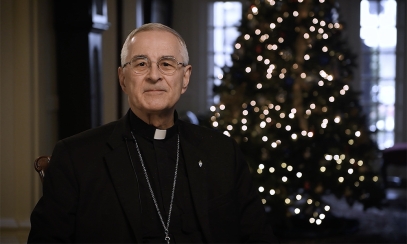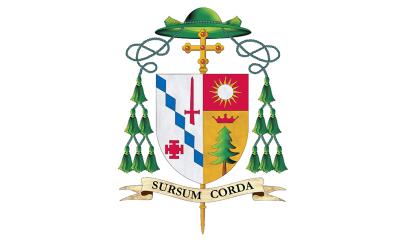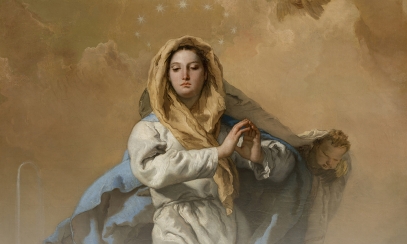
‘The Living Water That Jesus Came to Give’
Bishop Raica Celebrates the Third Sunday of Lent
Bishop Raica Celebrates the Third Sunday of Lent
On March 20, Bishop Raica celebrated Mass at the Cathedral of St. Paul, marking the Third Sunday of Lent. The complete text of his homily follows herein.
On March 20, Bishop Raica celebrated Mass at the Cathedral of St. Paul, marking the Third Sunday of Lent. The complete text of his homily follows herein.
My friends, on Ash Wednesday, we considered our mortality. We were reminded that with all our earthly success in this life, we are but mere dust and ashes, needing life, needing to be turned to face God, needing to rise again, needing constant conversion if we truly want a life of purpose and meaning leading to true, genuine joy and happiness.
Then, the First Sunday of Lent, we headed into the desert, a place of extremes, where life and death, good and evil, are locked in constant battle. These represent the fundamentals of our life – to know ourselves and our relationship with God in a most critical and intimate way.
Last Sunday, we were brought from the desert to the mountain top – Mt. Tabor – where we were given a sneak preview of coming attractions about the meaning of our destiny in Christ. That is what’s in store for the faithful believer through the ineffable mystery of the Transfiguration. The path to get there: “Here is my beloved Son, listen to Him!”
Today, and the next couple Sundays, we will study together three key figures that will bring us up to the Passion of Christ. They are the woman at the well, the man born blind, and Jesus’ dear friend Lazarus who died and was brought back to life.
While we reflect upon these Gospels the next few weeks, we know that we are embarking on a journey of a lifetime. We only get one shot at it.
Today, the woman at the well commands our attention. Through her and her need, her thirst, we come to know something about: 1) ourselves; 2) our relationship to Christ; and 3) the hope that Christ has for each of us. A brief word now about each of these aspects.
I begin with a true story about a bishop whom I knew and who has since gone to the Lord. He had a limp when he walked - a limp because in his teens, he had a leg amputated because of a congenital defect.
He recalled the experience of visiting the man who made prostheses, wooden legs. Sitting in a waiting room filled with kids his age needing various replacement limbs, he explained: “We’d sit in a room all together, and there was a certain bond because we were all missing something. And we wouldn’t let the others get away with anything. It didn’t take a social worker to make us aware of that. It made each one of us feel normal to be together like that.”
So, this is the point: “We were all missing something.” Whether we consider the woman at the well, or next Sunday’s story of the man born blind, Bartimaeus, or the Sunday after that with Lazarus, who was brought back to life by Christ, each was missing something. Each needed something they couldn’t give themselves. Like that room full of kids who needed limbs, we acknowledge that our spiritual life, our souls are a lot like that: we need something, something we can’t give ourselves, something that only Christ can provide to make us complete and whole. That’s why we are here in this “waiting room.”
At first glance, the story of the woman at the well illustrates the compassionate side of our Lord. He is tired, and hot, and thirsty. It’s midday in Palestine – probably a lot like here in the summertime. Yet still, He is friendly and sympathetic to a woman He has never met before and whose name we don’t know – only her ethnicity, a Samaritan.
In fact, it was unheard of for a rabbi even to speak in a friendly way to a woman in public, let alone a foreign woman. Moreover, it was all but a crime for a Jewish person to speak to a Samaritan and to request a drink of water from her. As a Samaritan, a person and by extension their cups and eating utensils were considered “unclean.” Imagine her surprise and wonder when He uttered those famous four words, “Give me a drink!”
Jesus paid little attention to the human cultural barriers and stereotypes and biases of the day. He encounters the woman at the well, not in terms of race, gender, nationality, or creed - or other social, religious, or political filters - but in terms of her humanity, her human dignity, and her inner spirit in need of healing and refreshment. Her search was for true and lasting fulfillment. It is evident that the woman, as we continue to read the passage, is not exactly a model of moral virtue. Yet, somehow, she feels the genuineness and exceptional nature of Christ. She is not afraid of Him; she opens her heart to Him; she listens to Him; and she comes to believe in Him.
The point is this: the Gospel demonstrates the main point for our consideration today. The woman explains to our Lord, “Sir, You don’t have a bucket and the well is deep. Where would you get that life-giving water?” But Jesus counters with the fact that He is not trying to quench physical thirst but a spiritual thirst, a thirst that no physical water will ever quench; a thirst in your soul, in your heart that begs for a presence that quells the interior restlessness.
We all have a spiritual thirst, likened to our physical thirst for water. Some call it an inner emptiness, or our deepest inner longings – a “thirst for God.” It was experienced at the beginning of time and continues down to our present day. St. Augustine calls it a “restlessness” that is only satisfied when one finds “rest in God.”
Each of us here has something missing. Oftentimes, it is not visible to the naked eye or the senses like a missing limb. It is something more than our day-to-day worries. We long for something that will give direction and meaning to our meandering lives, a sure guide and purpose for living, a reason to keep believing, a motivation to be a believer and a missionary disciple of Jesus Christ, a search for something - or someone who tells us everything about ourselves, who knows us inside and out already. It is found in the same struggle as the woman at the well. In that surprising moment, or “encounter” with Christ, when her life bumped up against a new reality, everything changed.
Isn’t it amazing how easily we can nod our heads in agreement, understanding this point, intellectually speaking? Confronting myself with the brutal reality of how this affects me can be unsettling. What am I putting in the place where God should be? Am I trying to satisfy my deepest spiritual hungers and thirsts with things that are temporary? We can go down the list of the promises made that result in an elusive temporary happiness. Is it that I long to receive Jesus – Body, Blood, Soul, and Divinity – in person with the believing community which is the Body of Christ? Still, He waits for an answer from us. We can express our desires to be united with Him in a spiritual communion. We can pour out our hearts and souls to Him. We can listen to Him, waiting in silence, praying for those afflicted in Ukraine, in places that are violent today in our cities and for families and relationships that have frayed at the edges. What we do know is that whenever we are alone or afraid, we look for a presence to take us by the hand and walk with us. That presence in Christ – present in the churches in most of our communities throughout the Diocese of Birmingham. Typically, He comes to us in our moment of uncertainty, and He will, as He promised, walk with us every day.
The bishop I quoted above concluded, “The lesson I learned is that all of us are imperfect and all of us are failures and we’re all missing something we wish we had.”
In responding to our need, in His mercy, He gave us Himself - to be with us. We are not alone and have at our disposal the life-giving water just as the Samaritan woman did.
As we prepare now to approach the altar of Christ’s love, we bring our imperfections, our lacks, all that we are missing and rely on the living water that Jesus came to give. On this Sunday throughout our churches, the catechumens who are the Elect and who will be baptized at the Easter Vigil will have their first scrutiny in which we pray that they know of the embrace of prayers of this Christian community for them on their journey into the faith!
Mindful that Mary, our Mother, treasured all the words that came from our Lord, may we also know that her maternal care for us points us to her Son. Our discipleship as Catholic Christians is anchored in Christ, our only hope, who will never disappoint. May God bless you!



